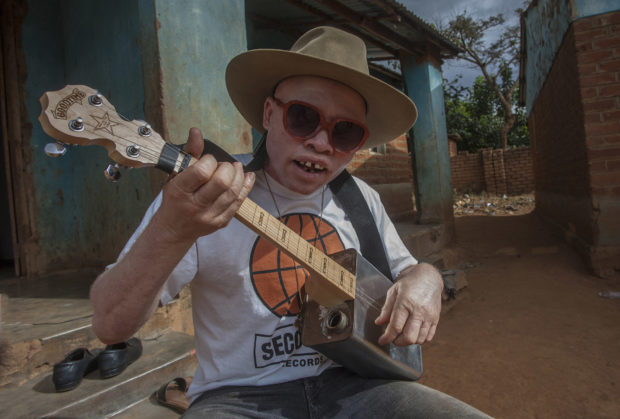Malawi’s albino busker ready for world stage

Credit to Author: hmallorca| Date: Tue, 09 Jul 2019 13:14:44 +0000
Like scores of other buskers, Lazarus Chigwandali plies the streets of Malawi’s capital Lilongwe hoping for a few coins from appreciative passers-by.
But Chigwandali is not your usual street musician. He is an albino, releasing a professional album, and the star of a documentary produced by Madonna.
Albinos are often targeted in brutal attacks in Malawi and other southern African countries because they have white skin due to a hereditary condition that causes a lack of pigmentation.
Killings, abductions and gruesome dismembering of body parts for witchcraft are all real dangers.
Despite the risks, Chigwandali, 39, has been out in front of the public for years playing his upbeat tunes on a homemade banjo and a drum that he hits with a pedal operated by his right foot.
His big break came just last year when a tourist took a video of him on a cellphone and the footage was seen by Swedish producer Johan Hugo, who asked him to record an album.
Chigwandali, who sings in the local Chichewa language, draws on his tough upbringing for his music, telling of constant harassment, suspicion and the threat of physical attack.
“Growing up, people did not want us being close to them because of our skin,” Chigwandali told AFP. “People would leave when I went to watch a football match with my younger brother (also an albino), others would jostle us.
“The album talks about the plight of persons with albinism. How people should not stigmatize others,” he added.
‘Blows you away’
Chigwandali’s music stands out on its own, energetic with sharp vocals that catch everyone’s attention as they walk by.
Hugo, the Swedish producer, was so impressed by the video clip that he tracked down the Malawian busker and offered to record his music.
“A few golden times in life something blows you away in such an amazing way you just cry and laugh and shake your head,” Hugo said later on social media. “(It was) one of the coolest and most emotional moments of my life.”
Chigwandali still busks occasionally to provide for his wife and three sons, two of them albinos, though he hopes the blossoming projects he is involved with will soon bring in a regular income.
He wears a wide-brimmed hat to keep off the sunlight that causes painful damage to his sensitive, heavily-freckled skin, and a traditional handmade shirt with a matching pair of trousers.
Ikponswa Ero, the United Nations’ chief expert on albinism, told AFP that Chigwandali was playing a unique role in tackling prejudice against albinos.
“He is using the arts for advocacy, which is a powerful tool because it touches people’s hearts, so he is really doing something important here,” Ero said. “People like Lazarus complement people like myself who report and help build policy.”
And Malawi, one of the world’s poorest and most aid-dependent countries, has experienced a surge in violent attacks on people with albinism.
In a report last year, Amnesty International said that since November 2014, there had been 148 crimes reported against people with albinism, with at least 21 deaths.
For Chigwandali, he said his “recent status as a famous musician has made it difficult for me to be a target because I am more prominent. So, now I go to the village without the fear of being abducted.”
‘Give voice to albinos’
Originally from the town of Dedza in central Malawi, Chigwandali moved to Lilongwe after his much-loved younger brother died of skin cancer in 2006.
Superstar singer Madonna met him during a visit to Malawi last year and took an executive producer credit in the documentary, simply titled “Lazarus”, which premiered at the Tribeca Film Festival in New York in April.
“A powerful voice of a new generation in Malawi,” Madonna wrote beneath a picture of the pair on social media when they performed together in Malawi.
As well as Madonna, Chigwandali hopes to emulate Salif Keita, the Malian afro-pop star singer who also has albinism.
Now preparing for his album launch, he has released a promotional track “Ndife Alendo” (“We are strangers”) which has been played on several BBC radio stations.
“My message is reaching the whole world now,” Chigwandali said. “But there has also been really amazing support from Malawi radio and TV, I want people in my home country to hear this music and appreciate it.
“This has all been a rollercoaster ride for me, these things do not happen in real life normally. I do not know what to expect. But I trust that people want the best for me,” he added. “I hope my music gives a voice to people with albinism, so they understand they are as worthy as any other human being.” HM/JB
RELATED STORIES:
Lisbon fetes ‘saint of love’ with free deluxe weddings